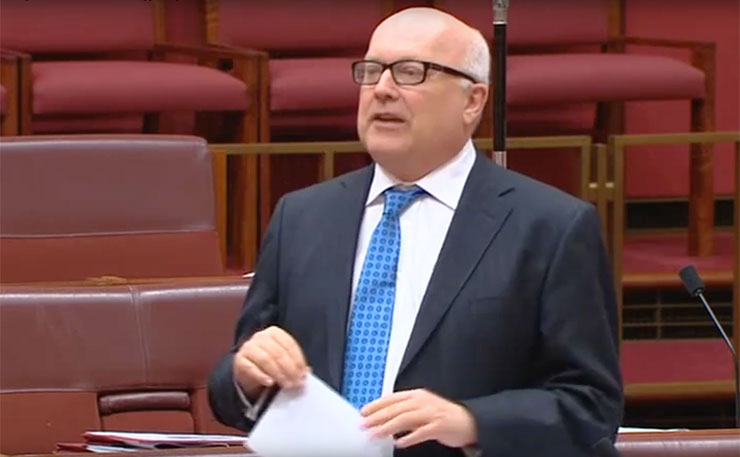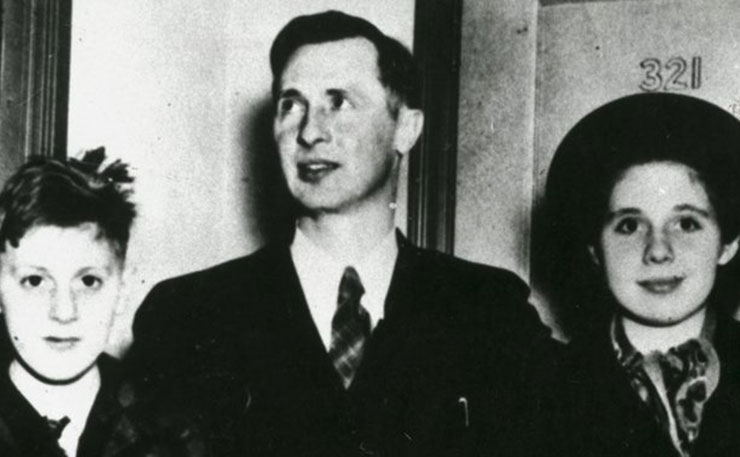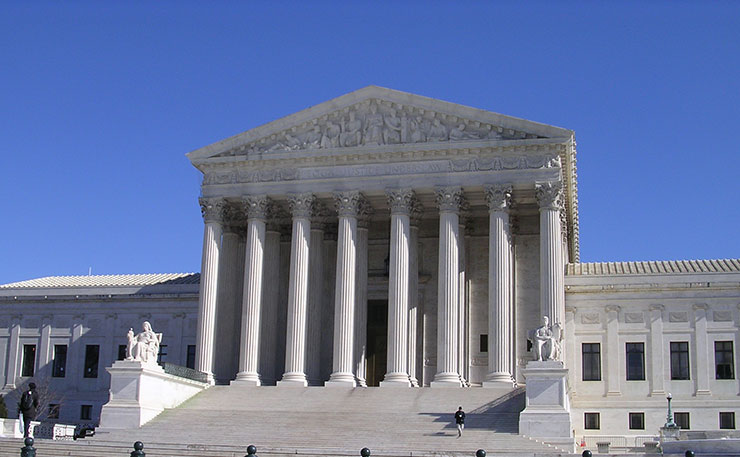“If there is any fixed star in our constitutional constellation, it is that no official, high or petty, can prescribe what shall be orthodox in politics, nationalism, religion, or other matters of opinion or force citizens to confess by word or act their faith therein.” – Justice Robert Jackson, 1943
Malcolm Turnbull may be a sophisticated lawyer, but it didn’t take long for him to join in the national dog-whistle. That is, “It is not compulsory to live in Australia. if you find Australian values are, you know, unpalatable, then there’s a big wide world out there and people have got freedom of movement”. Opposition Leader Bill Shorten, unable to oppose official racism from the Coalition, rushed to agree: “If you really hate Australia, well then you should go.”
Though it is in a sense predictable, it should be regarded as strange that in the name of Australian values, the major parties are embracing intolerance. Though we are supposedly a secular country, mainstream political discourse is approaching consensus on political dogmas that shouldn’t be challenged. Those who adopt “Australian” values – whatever those might be – can stay in Australia. Everyone else should leave.
There are lots of reasons someone might want to live in a country. I don’t see that one reason is more valid than another. One person might live in Australia because he loves the country. Another might do so because she loves her family. Another person might just live her because that’s where she was born, and out of inertia isn’t interested in looking into living in other countries. Any citizen of Australia can live here for whatever reason they want.
Attorney-General George Brandis once scandalised many Australians with the comment that we have the right to be bigots. Brandis expressed horror that a man could be taken to “federal court merely because he expressed an opinion about a social or political matter”. Yet it seems to be perfectly acceptable to repeatedly, openly state that people with unpopular political views should leave Australia. It seems only those who adhere to official orthodoxies are welcome.

Saying that those who don’t share Australian values should leave contains within it a certain dog-whistle. Suggesting that dissidents should leave implies that there is something less Australian about them than the rest of us. It doesn’t quite go so far as to say that they are foreign. Just that they would be happier somewhere which is foreign. And as it so happens, this rhetoric is targeted at Muslims who don’t like Australian values.
Though this may offend Australian patriots, if intolerance of political unorthodoxy is to be an Australian value, I think Australia should change. Indeed, I think we would benefit from importing values from another country. That is, from revisiting principles of freedom of thought established over 70 years ago in the Supreme Court of the United States of America.
The persecution of Jehovah’s Witnesses
In a study of hate speech and civil liberties in the United States, Samuel Walker discusses the case of the Jehovah’s Witnesses. Walker notes that it may surprise many to know that “For more than a decade… they were the most hated group in America, the target of legal restrictions and mob violence.” Today, they seem a “gentle and passive lot, noticed mainly for their Kingdom Hall places of worship and their occasional door-to-door canvassing”.
Yet once upon a time, they were akin to what Westboro Baptist Church (“God Hates Fags”) is today. Walker identifies them as a “hate group, mounting vicious attacks on other religions, particularly the Roman Catholic Church.” They thought, “Satan was everywhere”, and “manifested himself in organised religious groups.” Other religious groups were “imposters” and “racketeers”, and the Catholic Church was the biggest “racket” of them all. The leader of the Witnesses wrote a book about how evil the Catholic Church is, calling it an old “harlot”, with a “filthy record” and so on.
They also didn’t like Jews.
Besides unpopular doctrines, their tactics were aggressively confrontational. Walker writes that they would “descend on a community en masse” in what they called a “locust” strategy. There were millions of members across the country, and aggressive denunciations wasn’t the kind of tactic that would win them much popularity.
The Witnesses began their legal battles for freedom of speech in the 1930s. Some were about legal restrictions on their right to hand out pamphlets. Others were about restricting public attacks on the Pope. They suffered their first major defeat in the Supreme Court in 1940. The record is reviewed in a book on the Supreme Court by US historian Peter Irons.
In 1933, Nazi Germany banned the Jehovah’s Witnesses for refusing to salute the Nazi flag in schools and public events. Ten thousand Witnesses were sent to concentration camps for this defiance. In response, the leader of the American Witnesses, Joseph Rutherford, denounced compulsory flag-salute laws. He singled out for praise a year three student who had refused to salute the flag in school, saying other Witnesses “who act wisely will do the same thing”.
In America, the Gobitas family took this seriously. William and Lillian, in years five and seven in 1935, promptly stopped saluting the flag.

Lillian said that she warned the teacher of her planned action, and the teacher “hugged me and said she thought it was very nice, to have courage like that. But the students were awful.” Afterwards, when she came to school, they would “throw a hail of pebbles”. The Superintendent saw to it that the flag would be saluted every day, and that failing to do so would be an “act of insubordination”.
The two children were duly expelled for breaching the new rule.
“National unity is the basis of national security”
Patriotic American groups across the country ensured the school board could defend their new rules in courts, all the way to the Supreme Court. They argued that the salute wasn’t religious, and was simply about inculcating “loyalty to the state and national government”.
Supreme Court Justice Felix Frankfurter wrote the lead opinion of the court in 1940, rejecting the arguments of the Gobitas family. Quoting the earlier Supreme Court Justice Oliver Wendell Holmes, he wrote that, “We live by symbols”. The flag “is the symbol of our national unity, transcending all internal differences… National unity is the basis of national security”.
Exempting the Gobitases from saluting the flag “might cast doubts in the minds of the other children”, and weaken their patriotic loyalty too. Frankfurter further lectured the Gobitas family that they shouldn’t debate “issues of educational policy” in the courtroom, but should fight the issue “in the forum of public opinion” and the political realm. The only dissenter was Justice Harlan Fiske Stone.
Irons observed that, “Frankfurter’s opinion unleashed a wave of attacks on Witnesses across the country. Within two weeks of the Court’s decision”, hundreds of attacks were reported. In Maine, a Kingdom Hall was burned. The police helped a mob disperse a Bible meeting in Maryland. A chief of police and deputy sheriff forced a group of Witnesses to drink castor oil, then paraded them through the streets whilst tied together with rope. Another witness was kidnapped and castrated.
Walker observes that violence had been directed at the Witnesses before, but the judgment seemed to trigger a “dramatic escalation” of it. The Justice Department reached a stronger conclusion: “In the two years following the decision, the files of the Department of Justice reflect an uninterrupted record of violence and persecution of the Witnesses. Almost without exception, the flag and the flag salute can be found as the percussion cap that sets off these acts.”
The fixed star
The case wasn’t just followed by violence. There were increased expulsion of Witnesses for not saluting the flag, and sharp criticisms of the judgment by segments of the legal community.
In 1942, three judges of the Supreme Court admitted that they had been wrong in joining “in the opinion in the Gobitis [sic]case”, which “was wrongly decided” (And also wrongly spelt –Ed]. The new group of four became a majority of six out of nine on the court, when Justices Robert Jackson and Wiley Rutledge were appointed to the Supreme Court.
In 1943, Justice Jackson wrote the lead judgment in the case that overturned Gobitis.

Filled with grace, power and eloquence, it makes compelling reading. It is worth recalling that Gobitis was overturned when the US had gone to war with Japan and Nazi Germany, and there was a very live and real threat to US national security. Yet in the face of this, the court courageously insisted on the need to protect political dissent and unorthodoxy.
Justice Jackson observed that:
“Struggles to coerce uniformity of sentiment in support of some end thought essential to their time and country have been waged by many good as well as by evil men. Nationalism is a relatively recent phenomenon but at other times and places the ends have been racial or territorial security, support of a dynasty or regime, and particular plans for saving souls.
As first and moderate methods to attain unity have failed, those bent on its accomplishment must resort to an ever-increasing severity. As governmental pressure toward unity becomes greater, so strife becomes more bitter as to whose unity it shall be.
Probably no deeper division of our people could proceed from any provocation than from finding it necessary to choose what doctrine and whose program public educational officials shall compel youth to unite in embracing.
Ultimate futility of such attempts to compel coherence is the lesson of every such effort from the Roman drive to stamp out Christianity as a disturber of its pagan unity, the Inquisition, as a means to religious and dynastic unity, the Siberian exiles as a means to Russian unity, down to the fast failing efforts of our present totalitarian enemies.
Those who begin coercive elimination of dissent soon find themselves exterminating dissenters. Compulsory unification of opinion achieves only the unanimity of the graveyard.”
Justice Jackson pointedly noted that the issue would have been clear, but for patriotism clouding their minds. That is, “The case is made difficult not because the principles of its decision are obscure but because the flag involved is our own.”
He noted the importance of allowing dissent on the most cherished American values. He explained that:
“We can have intellectual individualism and the rich cultural diversities that we owe to exceptional minds only at the price of occasional eccentricity and abnormal attitudes. When they are so harmless to others or to the State as those we deal with here, the price is not too great. But freedom to differ is not limited to things that do not matter much. That would be a mere shadow of freedom. The test of its substance is the right to differ as to things that touch the heart of the existing order.”
He followed with one of the more lyrical and renowned passages from the US Supreme Court’s history: “If there is any fixed star in our constitutional constellation, it is that no official, high or petty, can prescribe what shall be orthodox in politics, nationalism, religion, or other matters of opinion or force citizens to confess by word or act their faith therein.”
It is worth recalling that as obvious as the principles of Justice Jackson’s judgment might appear, they were established in defence of an extremely unpopular and marginalised group, which openly flouted America’s most cherished values.
Australia has not yet reached those basic principles. The leaders of Australia’s major political parties are determined to establish what shall be orthodox in values, even as they claim to embrace liberal values.
If those who find Australia’s values “unpalatable” help to establish tolerance in Australia, as the Jehovah’s Witnesses did in the US 70 years ago, they will have made a worthier contribution than many of our most determined patriots.
Donate To New Matilda
New Matilda is a small, independent media outlet. We survive through reader contributions, and never losing a lawsuit. If you got something from this article, giving something back helps us to continue speaking truth to power. Every little bit counts.




